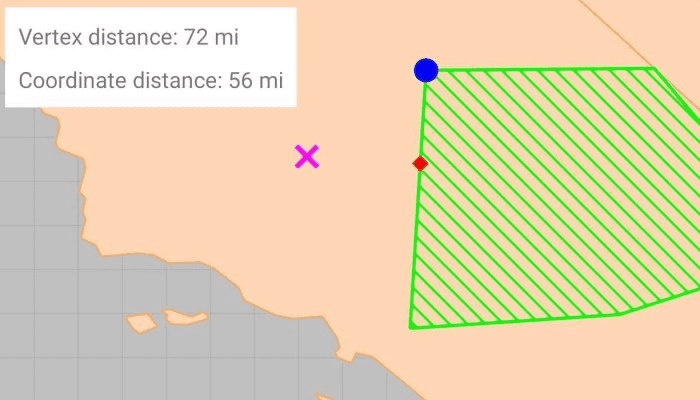Find the closest vertex and coordinate of a geometry to a point.

Use case
Determine the shortest distance between a location and the boundary of an area. For example, developers can snap imprecise user clicks to a geometry if the click is within a certain distance of the geometry.
How to use the sample
Click anywhere on the map. A magenta cross will show at that location. A blue circle will show the polygon's nearest vertex to the point that was clicked. A red diamond will appear at the coordinate on the geometry that is nearest to the point that was clicked. If clicked inside the geometry, the red and magenta markers will overlap. The information box showing distance between the clicked point and the nearest vertex/coordinate will be updated with every new location clicked.
How it works
- Get a
Geometryand aPointto check the nearest vertex against. - Call
GeometryEngine.nearestVertex(inputGeometry, point). - Use the returned
ProximityResultto get thePointrepresenting the polygon vertex, and to determine the distance between that vertex and the clicked point. - Call
GeometryEngine.nearestCoordinate(inputGeometry, point). - Use the returned
ProximityResultto get thePointrepresenting the coordinate on the polygon, and to determine the distance between that coordinate and the clicked point.
Relevant API
- GeometryEngine
- ProximityResult
Additional information
The value of ProximityResult.distance is planar (Euclidean) distance. Planar distances are only accurate for geometries that have a defined projected coordinate system, which maintain the desired level of accuracy. The example polygon in this sample is defined in California State Plane Coordinate System - Zone 5 (WKID 2229), which maintains accuracy near Southern California. Accuracy declines outside the state plane zone.
Tags
analysis, coordinate, geometry, nearest, proximity, vertex
Sample Code
/*
* Copyright 2020 Esri
*
* Licensed under the Apache License, Version 2.0 (the "License")
* you may not use this file except in compliance with the License.
* You may obtain a copy of the License at
*
* http://www.apache.org/licenses/LICENSE-2.0
*
* Unless required by applicable law or agreed to in writing, software
* distributed under the License is distributed on an "AS IS" BASIS,
* WITHOUT WARRANTIES OR CONDITIONS OF ANY KIND, either express or implied.
* See the License for the specific language governing permissions and
* limitations under the License.
*/
package com.esri.arcgisruntime.sample.nearestvertex
import android.graphics.Color
import android.os.Bundle
import android.view.MotionEvent
import android.view.View.VISIBLE
import android.widget.TextView
import androidx.appcompat.app.AppCompatActivity
import androidx.constraintlayout.widget.ConstraintLayout
import com.esri.arcgisruntime.ArcGISRuntimeEnvironment
import com.esri.arcgisruntime.geometry.*
import com.esri.arcgisruntime.layers.FeatureLayer
import com.esri.arcgisruntime.mapping.ArcGISMap
import com.esri.arcgisruntime.mapping.view.DefaultMapViewOnTouchListener
import com.esri.arcgisruntime.mapping.view.Graphic
import com.esri.arcgisruntime.mapping.view.GraphicsOverlay
import com.esri.arcgisruntime.mapping.view.MapView
import com.esri.arcgisruntime.portal.Portal
import com.esri.arcgisruntime.portal.PortalItem
import com.esri.arcgisruntime.symbology.SimpleFillSymbol
import com.esri.arcgisruntime.symbology.SimpleLineSymbol
import com.esri.arcgisruntime.symbology.SimpleMarkerSymbol
import com.esri.arcgisruntime.sample.nearestvertex.databinding.ActivityMainBinding
import kotlin.math.roundToInt
class MainActivity : AppCompatActivity() {
private val activityMainBinding by lazy {
ActivityMainBinding.inflate(layoutInflater)
}
private val distanceLayout: ConstraintLayout by lazy {
activityMainBinding.distanceLayout
}
private val mapView: MapView by lazy {
activityMainBinding.mapView
}
private val vertexDistanceTextView: TextView by lazy {
activityMainBinding.vertexDistanceTextView
}
private val coordinateDistanceTextView: TextView by lazy {
activityMainBinding.coordinateDistanceTextView
}
// California zone 5 (ftUS) state plane coordinate system.
private val statePlaneCaliforniaZone5SpatialReference = SpatialReference.create(2229)
override fun onCreate(savedInstanceState: Bundle?) {
super.onCreate(savedInstanceState)
setContentView(activityMainBinding.root)
// authentication with an API key or named user is required to access basemaps and other
// location services
ArcGISRuntimeEnvironment.setApiKey(BuildConfig.API_KEY)
// create a graphic for the polygon
val polygonPoints = PointCollection(statePlaneCaliforniaZone5SpatialReference)
polygonPoints.addAll(
listOf(
Point(6627416.41469281, 1804532.53233782),
Point(6669147.89779046, 2479145.16609522),
Point(7265673.02678292, 2484254.50442408),
Point(7676192.55880379, 2001458.66365744),
Point(7175695.94143837, 1840722.34474458)
)
)
val polygon = Polygon(polygonPoints)
val polygonOutlineSymbol = SimpleLineSymbol(SimpleLineSymbol.Style.SOLID, Color.GREEN, 2f)
val polygonFillSymbol =
SimpleFillSymbol(
SimpleFillSymbol.Style.FORWARD_DIAGONAL,
Color.GREEN,
polygonOutlineSymbol
)
val polygonGraphic = Graphic(polygon, polygonFillSymbol)
// create graphics with symbols for tapped location, nearest coordinate, and nearest vertex
val tappedLocationGraphic = Graphic().apply {
symbol = SimpleMarkerSymbol(SimpleMarkerSymbol.Style.X, Color.MAGENTA, 15f)
}
val nearestCoordinateGraphic = Graphic().apply {
symbol = SimpleMarkerSymbol(SimpleMarkerSymbol.Style.DIAMOND, Color.RED, 10f)
}
val nearestVertexGraphic = Graphic().apply {
symbol = SimpleMarkerSymbol(SimpleMarkerSymbol.Style.CIRCLE, Color.BLUE, 15f)
}
// create a graphics overlay to show the polygon, tapped location, and nearest vertex/coordinate
val graphicsOverlay = GraphicsOverlay().apply {
graphics.addAll(
listOf(
polygonGraphic,
tappedLocationGraphic,
nearestCoordinateGraphic,
nearestVertexGraphic
)
)
}
mapView.apply {
// create a map using the PortalItem
// and add the FeatureLayer to the map view's basemap
map = ArcGISMap(statePlaneCaliforniaZone5SpatialReference)
val portalItem = PortalItem(
Portal("https://arcgisruntime.maps.arcgis.com", false),
"99fd67933e754a1181cc755146be21ca"
)
val usStatesGeneralizedLayer = FeatureLayer(portalItem, 0)
map.basemap.baseLayers.add(usStatesGeneralizedLayer)
// add the graphics overlay to the map view
graphicsOverlays.add(graphicsOverlay)
// zoom to the polygon's extent
setViewpointGeometryAsync(polygon.extent, 100.0)
// get the nearest vertex on tap
onTouchListener = object : DefaultMapViewOnTouchListener(this@MainActivity, mapView) {
override fun onSingleTapConfirmed(e: MotionEvent): Boolean {
// create a screen point from where the user tapped
val screenPoint = android.graphics.Point(e.x.roundToInt(), e.y.roundToInt())
// create a map point from the screen point
val mapPoint: Point = mapView.screenToLocation(screenPoint)
// show where the user clicked
tappedLocationGraphic.geometry = mapPoint
// use the geometry engine to get the nearest vertex
val nearestVertexResult = GeometryEngine.nearestVertex(polygon, mapPoint)
// set the nearest vertex graphic's geometry to the nearest vertex
nearestVertexGraphic.geometry = nearestVertexResult.coordinate
// use the geometry engine to get the nearest coordinate
val nearestCoordinateResult =
GeometryEngine.nearestCoordinate(polygon, mapPoint)
// set the nearest coordinate graphic's geometry to the nearest coordinate
nearestCoordinateGraphic.geometry = nearestCoordinateResult.coordinate
// show the distances to the nearest vertex and nearest coordinate
distanceLayout.visibility = VISIBLE
val vertexDistance = (nearestVertexResult.distance / 5280.0).toInt()
val coordinateDistance = (nearestCoordinateResult.distance / 5280.0).toInt()
vertexDistanceTextView.text = getString(R.string.nearest_vertex, vertexDistance)
coordinateDistanceTextView.text =
getString(R.string.nearest_coordinate, coordinateDistance)
return true
}
}
}
}
override fun onPause() {
mapView.pause()
super.onPause()
}
override fun onResume() {
super.onResume()
mapView.resume()
}
override fun onDestroy() {
mapView.dispose()
super.onDestroy()
}
}